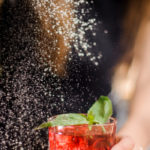Cravings are a key component in the overall affliction of alcoholism. People who have never experienced alcoholism or a dependency on any substance are often confused in how it is someone with alcoholism could continue to crave a substance which causes so much harm. The evidence is human, and can be found in every one. Take, for a classic example, a piece of chocolate cake. Most people find cake to be delicious and many people find chocolate cake to be especially decadent. Biologically, when cake acts as a stimulus, the mouth starts to salivate, in expectation and wanting of the chocolate cake. Inside the brain, neurobiologically, there is the same exact process taking place which takes place when someone addicted to alcohol craves alcohol. A brain chemical called dopamine, which acts as a messenger for the experience of pleasure, starts producing as if the brain has already had the chocolate cake. In a way, dopamine is both a responder and a primer for the experience of sought after pleasure. The pleasure of chocolate cake comes from the biological effect sugar has on the brain- which is to produce a large amount of dopamine. Likewise, alcohol produces a large amount of dopamine. Through conditioning and repetitive behavior, both chocolate cake and alcohol become associated with feeling good. High on the sugar rush of chocolate cake or drunk on the intoxication of alcohol- the experience is nearly exactly the same.
New research suggests that from one person to the next, that experience may differ slightly depending on the prevalence of alcoholism in the family tree. Published in Biological Psychiatry: Cognitive Neuroscience and Neuroimaging, a study found that individuals who have alcoholism in their family will release more dopamine in the brain when they are expecting alcohol. Interestingly, people with a genetic history of alcoholism experience this increased release more than people who are actually diagnosed with alcohol use disorder, or people who do not have alcohol use disorder and also do not have any family history of alcohol use disorder. Meaning, even without personal alcoholism, the very presence of genetic alcoholism conditions the brain to release more dopamine in response to the prospect of consuming alcohol.
Treatment and recovery include a series of therapies, activities, and interventions which help to reprogram the brain, as well as build new neural pathways for the experience of pleasure. At Tree House Recovery in Portland, Oregon, men experience an innovative, individualized treatment plan utilizing the latest and tested evidence based practices for recovery from addiction. By creating sustainable changes, men create a sustainable recovery. For more information on how men are finding freedom from our programs, call: (503) 850-2474




